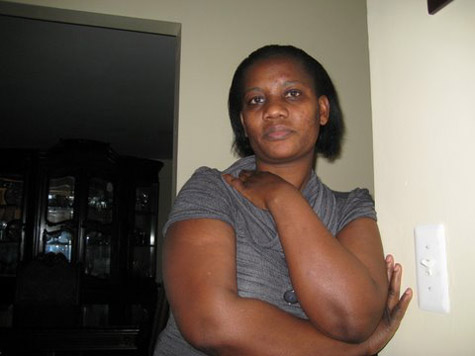
Rosemarie Jolcimat |
Their roof is a blanket held up by sticks, their bed is dirt. Every morning, they wake — the grandparents, aunts, uncles, nieces, nephews — and begin their journey on foot to search for something to eat and drink.
More often than not, they find nothing. Still, they always return to their spot by nightfall.
"What can they do?'' said Rosemarie Jolcimat, as she sat in the living room of her Pawtucket house talking about her relatives in earthquake-ravaged Haiti. "They have nowhere else to go.''
Reports about the devastation are heart wrenching enough for those without ties to the country; for people like Jolcimat, who was born in Haiti and still considers it home, the news brings even more grief and uncertainty.
Her parents, both 70, were among the lucky ones. They both survived. Her 16-year-old niece, Maninie, did not. As if that weren't sad enough, the family home in Petit-Goâve, a village outside Port-au-Prince, is so badly damaged it's unsafe to live in.
Home for Mémé Pauline and Papa Jean — as well as 10 other extended family members — is a makeshift tent in a squalid camp (really, a filthy lot in the village) that lacks sanitation and running water.
The disaster is off the front page, the search and rescue is officially over, but for Jolcimat, one of an estimated 4000 to 7000 Haitians in Rhode Island, the worries linger, as the need for shelter, food, water, and medicine continues to grow and concerns mount over outbreaks of disease, which could kill even more.
"It's like a nightmare,'' said Jolcimat. "I want it to be the end, but it doesn't look like the end.''
This week, she talked about the destruction and her fear that the world would soon forget about Haiti. She was surrounded by family photos, including an old one of her twins as little girls in their Sunday best, crisp white dresses with bell sleeves.
The television blared from the kitchen: Haiti's generation of amputees. She relies on CNN for information about her country and maybe, just maybe, she might glimpse her parents in a news report.
The gruesome images are difficult to watch — bandaged babies crying out for dead parents, bloated bodies dumped into mass graves, seemingly robust men gasping for breath and dying on camera.
"Everybody loses someone,'' she said.
Jolcimat moved to the United States 18 years ago when she was only 17 to flee the poverty and staggeringly high unemployment in Haiti, the poorest country in the Western Hemisphere. After living in Florida for a few years, she moved to Rhode Island in 1992 to be near her brother.
This country, she said, has given her more than she thought possible: she has a full-time job at the Rhode Island School of Design, where she works as a cashier in the cafeteria, and her three daughters, including Sherly, a student at the MET School in Providence, are thriving.
That peaceful life changed on January 12, the day the earth heaved. Without knowing yet what had happened, Jolcimat called her mother to chat; the phone rang and rang. A few minutes later, she called back; it was busy. Concerned, she called her cousin in Florida, who gave her the horrible news.